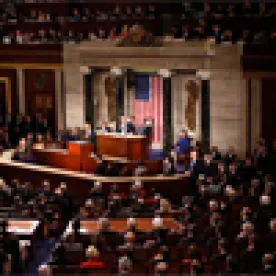Last week, the U.S. District Court for the District of Columbia ruled in favor of the Senate Permanent Subcommittee on Investigations in a rare case that has the potential to contribute significantly to the case law concerning congressional investigations. It is uncommon for a federal court to have an opportunity to rule on a congressional subpoena – congressional subpoenas generally cannot be challenged in court unless the recipient defies Congress and Congress votes to hold the recipient in contempt. Most private sector companies simply cannot endure the bad publicity and reputational damage that accompanies a congressional contempt proceeding. Backpage, an online forum for classified advertisements that includes advertisements for adult services, and its CEO Carl Ferrer apparently are not swayed by such concerns.
For more than a year, the Senate Permanent Subcommittee on Investigations has been conducting an investigation of Backpage as part of an inquiry into human trafficking. According to the National Center for Missing and Exploited Children, advertisements on Backpage are associated with “a majority of the child sex trafficking cases being reported” to the organization.
After conducting an interview of Backpage’s general counsel in June 2015, the Subcommittee subpoenaed Backpage for documents in July 2015. Almost immediately, Backpage objected to the subpoena on First Amendment grounds. After further back and forth, the Subcommittee subpoenaed Backpage’s CEO Carl Ferrer for a narrower set of documents and ordered him to appear at a hearing on November 19, 2015. Backpage produced a limited set of documents to the Subcommittee, but it continued to object to a further response on First Amendment grounds. Ferrer did not appear at the November hearing, and the Subcommittee held a hearing with an empty chair before it – another rarity in congressional investigations. The Subcommittee approved a resolution to enforce its subpoena, and the resolution was adopted by the full Senate in March 2016.
In its ruling last week, the District Court found for the Subcommittee, rejecting four defenses raised by Ferrer.
First, the court addressed Ferrer’s claim that it lacked jurisdiction to hear the case because the Senate sought to enforce only three of the eight requests contained in the subpoena. Ferrer’s argument was based on a unique aspect of the statute authorizing the Senate to enforce its subpoena in court – the statute states that the court may not “modify” the subpoena. In Ferrer’s view, selective enforcement equates to modification. The court disagreed, stating that the statute does not constrain the Subcommittee’s ability to seek partial enforcement of its subpoenas. Therefore, the court was enforcing, unmodified, those parts of the subpoena brought before it by the Senate.
Second, the court rejected Ferrer’s argument that the subpoena was not tied to a legitimate legislative purpose. Under Supreme Court precedents, Congress has the power to investigate any subject on which it can legislate. Given that Congress can legislate on sex trafficking and the internet, and Congress has previously legislated on internet publishers’ immunity for statements of third parties, the court easily concluded that the subpoena was related to a legitimate legislative purpose.
Third, the court examined Ferrer’s First Amendment defenses and concluded that they did not protect him from complying with the subpoena. Ferrer claimed that the Subcommittee’s subpoena encroached on his First Amendment rights, sought to punish disfavored speech, and chilled his exercise of his First Amendment rights. The court was unconvinced. The court was most critical of Ferrer’s attempted use of the First Amendment to shield Backpage from even searching for materials in response to the subpoena, determining which of the documents reflect speech protected by the First Amendment, and explaining the specific manner in which the subpoena would intrude on First Amendment rights. The court concluded that Ferrer’s position that “any responsive document that has not been produced contains constitutionally-protected information that no governmental need could possibly overcome” is “untenable and without legal support.”
Finally, the court rejected Ferrer’s claim that the investigation violated his due process rights by being ill-defined in scope and shifting in focus. The court described these arguments as “undeveloped,” “devoid of legal support,” and “unclear.”
The court ordered Ferrer to comply with the Subcommittee’s subpoena within ten days.
Instead of producing the subpoenaed documents, this week, Ferrer appealed the District Court’s decision to the Court of Appeals for the District of Columbia Circuit, and simultaneously sought to postpone his compliance with the subpoena while the appeal is pending. In his motion to stay compliance with the subpoena, Ferrer focused on his First Amendment arguments: The District Court “misapprehends the nature of Mr. Ferrer’s First Amendment claims and undervalued the constitutional interests at stake,” the filing said.
Depending on the outcome of the appeal, this case may contribute significantly to the case law concerning congressional investigations and the enforceability of congressional subpoenas.
Litigation to enforce a congressional subpoena against a private sector company or individual is rare. According to the Senate Legal Counsel’s filings in the case, the Senate has sought to enforce a subpoena under its civil enforcement authority only five times, with the last enforcement proceeding occurring in 1994. This case provides an opportunity for the appellate court to consider aspects of the statute that are rarely addressed in litigation, such as Ferrer’s argument regarding the statute’s limitation on courts modifying a subpoena.
Practitioners and scholars generally consider jurisdictional challenges to congressional investigations to be foreclosed by the modern scope of Congress’s legislative authority. Because Congress’s legislative reach is so broad, and its investigative authority is coextensive with its legislative authority, Congress can investigate practically anything, the reasoning goes. The appellate court may have an opportunity to address these issues if Ferrer continues to argue that the subpoena is not tied to a legitimate legislative purpose.
Finally, and potentially most significant, it appears that the D.C. Circuit will have an opportunity to address the limitations that constitutional protections place on congressional investigations. Although Congress takes a dim view of many privileges and protections, including the attorney-client privilege and executive privilege, Congress readily acknowledges that it is bound by constitutional limitations such as the First Amendment. There is very little recent case law addressing constitutional protections in the context of congressional investigations, even as the Supreme Court’s views on the First Amendment and other constitutional rights have evolved over recent decades.






 />i
/>i

